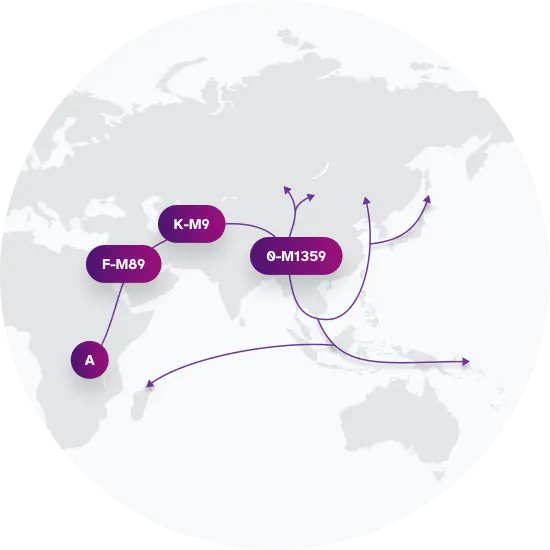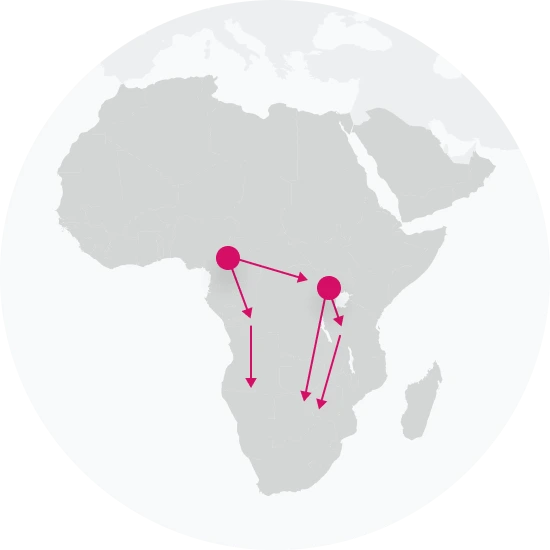Explore the Family Name Smalls
How common is the last name Smalls in the United States?
Based on the Decennial U.S. Census data, the popularity of the surname 'Smalls' increased between 2000 and 2010. In 2000, it was ranked as the 3049th most common surname, but by 2010, it had climbed to the 2888th position, showing a change of 5.28 percent in its rank. The count of people with this surname also grew by 14.11 percent during this period, with the number rising from 10,897 in 2000 to 12,435 in 2010. Consequently, the proportion of people named Smalls per 100,000 individuals rose from 4.04 to 4.22.
| 2000 | 2010 | Change | |
|---|---|---|---|
| Rank | #3,049 | #2,888 | 5.28% |
| Count | 10,897 | 12,435 | 14.11% |
| Proportion per 100k | 4.04 | 4.22 | 4.46% |
Race and Ethnicity of people with the last name Smalls
The ethnic identity associated with the surname 'Smalls' also saw some shifts between 2000 and 2010, according to the Decennial U.S. Census data. The majority of individuals with this last name identified as Black, although the percentage decreased slightly from 93.44 percent in 2000 to 90.49 percent in 2010. The percentage of those identifying as White and Hispanic increased from 2.81 and 1.45 percent respectively in 2000 to 3.78 and 2.46 percent in 2010. There was also a notable increase in the percentage of people who identified as belonging to two or more races and as American Indian and Alaskan Native, with changes of 45.26 percent and 100 percent respectively. The only ethnicity that saw a decrease was Asian/Pacific Islander, which fell from 0.27 percent in 2000 to 0.23 percent in 2010.
| 2000 | 2010 | Change | |
|---|---|---|---|
| Black | 93.44% | 90.49% | -3.16% |
| White | 2.81% | 3.78% | 34.52% |
| Two or More Races | 1.9% | 2.76% | 45.26% |
| Hispanic | 1.45% | 2.46% | 69.66% |
| American Indian and Alaskan Native | 0.14% | 0.28% | 100% |
| Asian/Pacific Islander | 0.27% | 0.23% | -14.81% |
Smalls ancestry composition
23andMe computes an ancestry breakdown for each customer. People may have ancestry from just one population or they may have ancestry from several populations. The most commonly-observed ancestry found in people with the surname Smalls is Ghanaian, Liberian & Sierra Leonean, which comprises 25.0% of all ancestry found in people with the surname. The next two most common ancestries are Nigerian (24.9%) and British & Irish (14.3%). Additional ancestries include Angolan & Congolese, Senegambian & Guinean, French & German, Spanish & Portuguese, and Indigenous American.
Ready to learn more about your ancestry? Get the most comprehensive ancestry breakdown on the market by taking our DNA test. Shop 23andMe
| ANCESTRY BREAKDOWN | COMPOSITION |
|---|---|
| Ghanaian, Liberian & Sierra Leonean | 25.0% |
| Nigerian | 24.9% |
| British & Irish | 14.3% |
| Other | 35.8% |

Possible origins of the surname Smalls
Your DNA provides clues about where your recent ancestors may have lived. Having many distant relatives in the same location suggests that you may all share common ancestry there. Locations with many distant relatives can also be places where people have migrated recently, such as large cities. If a large number of individuals who share your surname have distant relatives in a specific area, it could indicate a connection between your surname and that location, stemming from either recent ancestral ties or migration.
Based on 23andMe data, people with last name Smalls have recent ancestry locations all within the United Kingdom of Great Britain and Northern Ireland.
| RECENT ANCESTRY Location | Percentage |
|---|---|
| Glasgow City, United Kingdom | 25.30% |
| Greater London, United Kingdom | 25.30% |
| West Midlands, United Kingdom | 24.10% |
| Merseyside, United Kingdom | 24.10% |
| Greater Manchester, United Kingdom | 23.00% |
What Smalls haplogroups can tell you
Haplogroups are genetic population groups that share a common ancestor on either your paternal or maternal line. These paternal and maternal haplogroups shed light on your genetic ancestry and help tell the story of your family.
The top paternal haplogroup of people with the surname Smalls is O-F2415, which is predominantly found among people with East Asian & Indigenous American ancestry. Haplogroup O-F2415 is descended from haplogroup O-M1359. Other common haplogroups include E-M183 and O-F2859, which are predominantly found among people with European and East Asian & Indigenous American ancestry.
The most common maternal haplogroups of people with Smalls surname are: L1b1a, L3b, L2a1. These most commonly trace back to individuals of Sub-Saharan African ancestry.
 Paternal Haplogroup Origins O-M1359
Paternal Haplogroup Origins O-M1359
Your paternal lineage may be linked to the Cham
One of the many populations harboring members of haplogroup O1b1a1a1a1 is the Cham ethnic group, a group of people who speak Austronesian languages in Mainland Southeast Asia. Austronesian languages make up a language family that is extremely large and widespread, comprising over 350 million people on islands such as Madagascar, Easter Island, and many others. However, Austronesian languages are less common on mainland Asia, with a notable exception being the Chamic language. Research suggests that ancestors of the Cham people migrated from Southeast Asian islands to the mainland around the year 500 BCE, and that early Cham populations quickly began mixing with indigenous southern Vietnamese populations. As a result, the Chamic language now has words that were borrowed from languages spoken by indigenous Vietnamese people. It is likely that an ancestral Kinh population was one of the populations that mixed with the Cham people shortly after their migration to mainland Asia.
Your maternal lineage may be linked to speakers of the Bantu language family
About 5,000 years ago, many people in sub-Saharan Africa still relied on hunting, gathering, and foraging as their main means of collecting food. But that was soon going to change. People in West-Central Africa began experimenting with agriculture, cultivating the yams, legumes, peppers, and gourds that would became staples of sub-Saharan African diet. These people spoke languages belonging to the Bantu language family, and about 4,000 years ago they began to move.First, they headed east across the central rainforest. Eventually, the descendants of these migrants arrived at the farthest reaches of southern Africa. Later, other Bantu speakers who had remained in West Africa also began to travel down the western coast. As they traveled over a period of centuries, they both displaced and absorbed many other hunter-gatherer groups that were already living throughout Africa.Their agricultural and technological knowledge also diffused to other local groups. They often intermarried, sometimes adopting local cultural practices of those people they encountered. The languages that they brought with them from their ancestral homeland spread throughout sub-Saharan Africa, and today the majority of sub-Saharan African languages are Bantu.

What do people with the surname Smalls have in common?
Spoiler alert: it's complicated. People with the same last name are usually no more genetically similar than a randomly sampled group of people from the same population. That said, people with the same surname are more likely to have similar ancestries than randomly sampled individuals. The reason is the tendency of people with similar cultural or geographical backgrounds to preferentially mate with one another. That's why people who share a surname may be more likely to share traits and tendencies in common than people within the general population. Check out the percentages below to see the prevalences of tastes, habits, and traits of people with your surname compared with prevalences among 23andMe users.
Preferences
Traits
Habits

Kinesthetic Learner
Preferring to learn and process information through hands-on activities, practical experiences, and active engagement.
"Smalls" Surname 45.5%
23andMe Users 61.5%
Wellness
Are health conditions linked to the last name Smalls?
The short answer is that, if there is an association between surname and health, it's usually more about your ancestry than your name. Individuals with a given surname are no more genetically similar than the general population but often have similar ancestries. The populations of people associated with those shared ancestries often have sets of genetic variations, also known as alleles, in common. Some of those alleles are associated with a greater likelihood of developing certain diseases.
Disease variant frequency by ancestry
Disease allele frequencies in populations associated with the surname Smalls are shown below. Important Note: not everyone with a disease allele will develop these health condition






